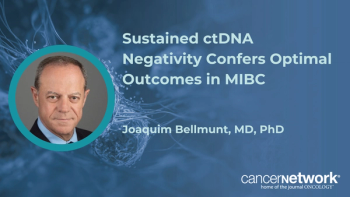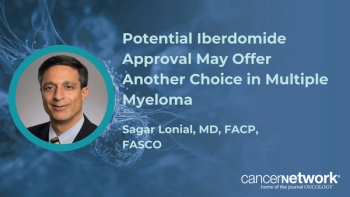
Local Consolidative Therapy Combo May Extend Survival in Stage IV NSCLC
A single-arm phase 2 study assessed local consolidative therapy regimens in patients with oligometastatic stage IV non–small cell lung carcinoma.
Local consolidative therapy (LCT) in combination with systemic chemotherapy may extend survival and achieve local control in a small cohort of patients with stage IV non–small cell lung carcinoma (NSCLC) with oligometastases for whom chemoradiotherapy (CRT) for thoracic disease was feasible, according to findings from a single-arm phase 2 study (UMIN000022431) published in Radiation Oncology.
Data from the trial reveal that at a median follow-up time of 42.1 months (95% CI, 13.6-not reached [NR]), the 2-year survival rate was 68.4% (80% CI, 52.6%-79.9%) among efficacy evaluable patients (n = 19). The median overall survival (OS) was 42.1 months (95% CI, 13.6-NR), and median progression-free survival (PFS) was 8.6 months (95% CI, 7.0-10.2). Additionally, data indicated that 11 (57.9%) experienced a partial response and 8 (42.1%) showed stable disease. The response rate was 57.9% (95% CI, 33.5%-79.9%).
“Aggressive LCT in combination with systemic chemotherapy for stage IV NSCLC with solitary and synchronous [oligometastases] revealed tolerability and possible efficacy,” Takaaki Tokito, MD, PhD, professor of Respirology, Neurology, and Rheumatology in the Department of Internal Medicine at Kurume University School of Medicine, wrote in the publication with study coinvestigators. “Further studies incorporating [immune checkpoint inhibitors] for treating oligometastatic disease are warranted and could lead to further outcome improvements. Additionally, exploring the optimal administration is also important for the results to be generalizable to clinical practice.”
Patients on trial were administered platinum-doublet chemotherapy and radiotherapy for thoracic disease and LCT for distant disease within 8 weeks of thoracic radiotherapy initiation or conclusion. Treatment consisted of concurrent CRT and subsequent consolidation chemotherapy and LCT. Furthermore, systemic chemotherapy consisted of either cisplatin plus vinorelbine or cisplatin plus docetaxel.
Thoracic radiotherapy began day 1 of study treatment and was given 5 times weekly for a total dose of 60 Gy split into 2-Gy fractions. LCT for oligometastases was administered within 8 weeks of systemic treatment inception or completion. The type of LCT was determined in consultation with radiologists, and stereotactic body radiotherapy and conventional radiotherapy were permitted.
A total of 19 patients were enrolled on trial and treated between June 2016 and May 2020, with an additional patient (n = 20) excluded due to trial termination as a result of slow patient accrual. The median age was 68 (range, 51-74) years, 13 (68.4%) patients were male, 17 (89.5%) had smoked, and all patients had an ECOG performance status score of 0 to 1. Additionally, 12 (63.2%) and 6 (31.6%) patients had adenocarcinoma or squamous cell carcinoma, respectively.
In total, 17 (89.5%) patients completed 4 cycles, with 2 patients (10.5%) discontinuing treatment after 3 cycles due to progressive disease. All patients received platinum-containing chemotherapy––18 receiving cisplatin plus vinorelbine and 1 receiving cisplatin plus docetaxel––and completed CRT during the concurrent phase and LCT for all oligometastases. Overall, 6 patients (31.5%) received surgery for oligometastases, and 13 (68.4%) were treated with radiotherapy only.
The primary study end point was 2-year survival. The trial’s secondary end points included investigator-assessed PFS, OS, and safety.
The most common grade 3 or greater adverse events (AEs) included decreased neutrophil counts (74%) and decreased white blood cell counts (68%), with febrile neutropenia occurring in 16% of patients. Common AEs related to radiotherapy included esophagitis (73.7%), radiation dermatitis (68.4%), and pneumonitis (10.5%); no AEs were related to LCT for oligometastases. Additionally, no treatment-related deaths were reported.
Reference
Tokito T, Yamada K, Ishii H, et al. Single-arm multicenter phase II study on aggressive local consolidative therapy in combination with systemic chemotherapy for stage IV non-small cell lung carcinoma with oligometastases: CURE-OLIGO (TORG1529). Radiat Oncol. 2025;20(1):2. doi:10.1186/s13014-024-02577-5
Newsletter
Stay up to date on recent advances in the multidisciplinary approach to cancer.



















































